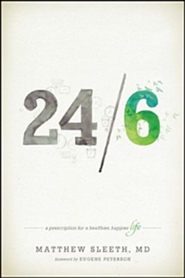I woke up to the sound of rain last Sunday, and the to-do list started pummeling faster and harder than the drops against the skylight.
- The sink has acquired that nasty yellow scum line on it again. Must clean this afternoon.
- When’s the last time I got in a good workout? Must connect with the treadmill at some point today.
- Oh yeah, I’m scheduled for coffee duty at church. Must get out of bed and caffeinate the congregation.
As the day wore on, the rain let up, but not so my inner taskmaster.
- The well-meaning friend at church described the dinner she was making for her husband that night. (I couldn’t pronounce most of the ingredients, let alone do any sort of alchemy with them in the kitchen.) Must cook something more exotic than tacos tonight.
- The freelance project deadline is looming. Must make a dent in that today.
But finally, ever so quietly, I heard a subtler voice beneath the deluge of my to-do list. It was a voice reminding me that today was the Sabbath. The day that flies in the face of productivity. The day that in some counterintuitive way recharges me to be whole and refreshed so I’ll be ready to face the six days ahead. The day that’s intended to be devoted to Someone else’s agenda rather than my own.
C. S. Lewis knew what it’s like to be pummeled with “fussing and frettings” from the moment our feet hit the ground:
It comes the very moment you wake up each morning. All your wishes and hopes for the day rush at you like wild animals. And the first job each morning consists simply in shoving them all back; in listening to that other voice, taking that other point of view, letting that other larger, stronger, quieter life come flowing in. And so on, all day. Standing back from all your natural fussing and frettings; coming in out of the wind.
It was a battle—I’m not going to lie. For once, though, the Sabbath won, and this was a battle I was happy to lose. The sink still sports its yellow ring, the treadmill accumulated dust all day, the freelance project was categorically ignored, and I reheated leftovers for dinner. And you know what? Nobody died. The world didn’t end.
I’m writing this down in hopes that I’ll remember. Next time, when all the to-dos rush at me like so many wild animals, I want to take my cues from Lewis and let that larger, stronger, quieter life come flowing in. I invite you to join me.
Come on in, out of the wind . . . and rest awhile.













